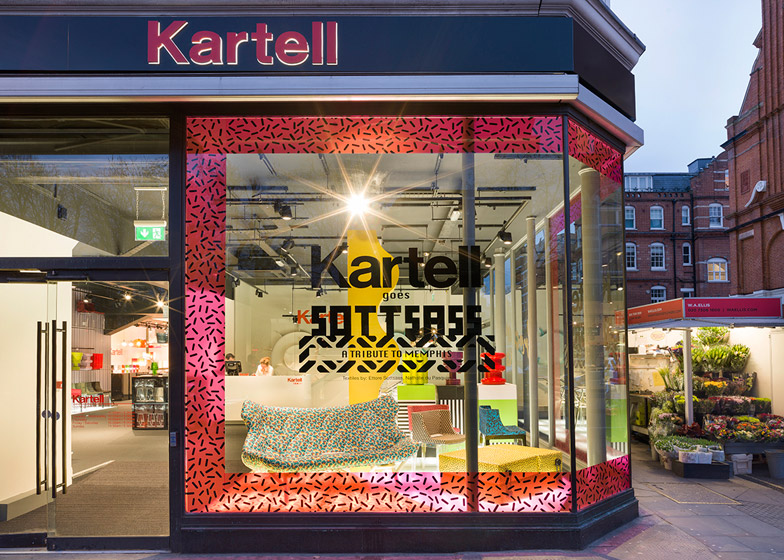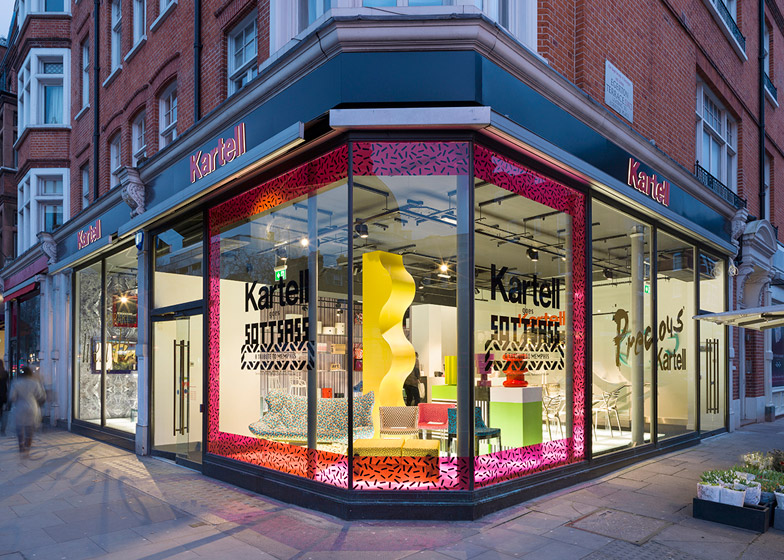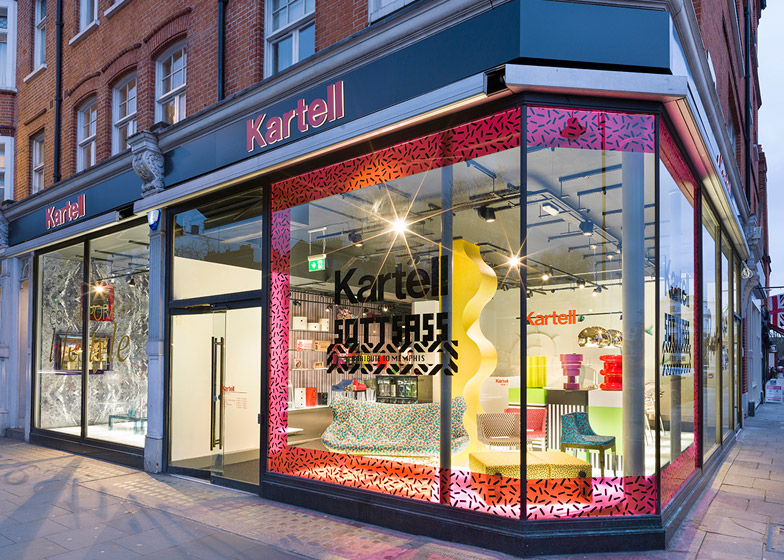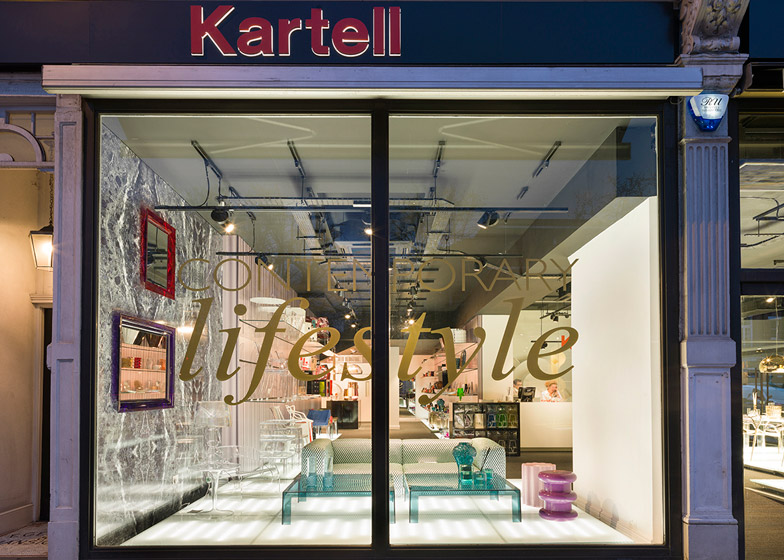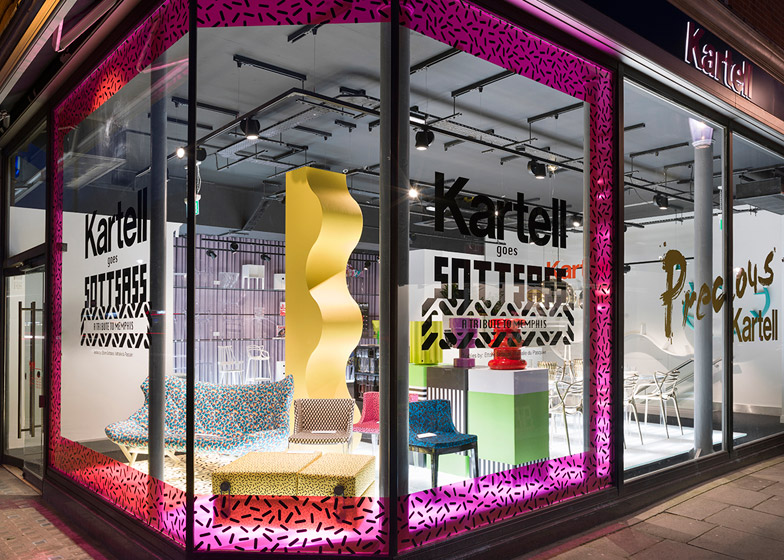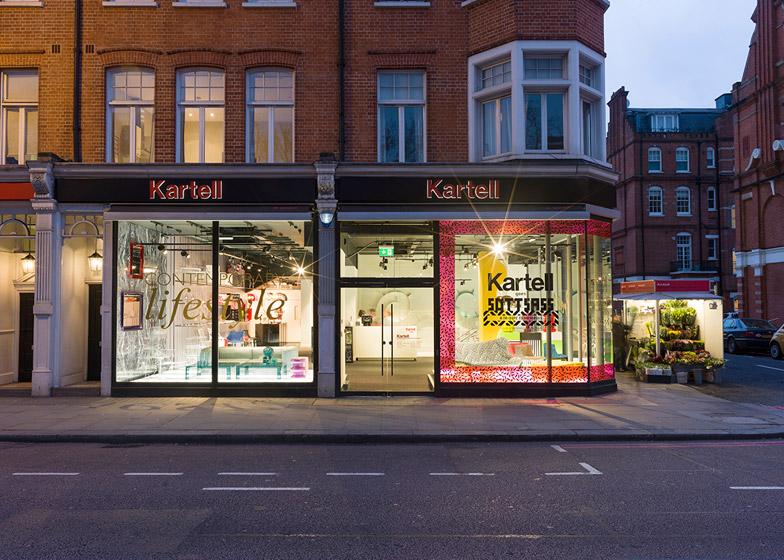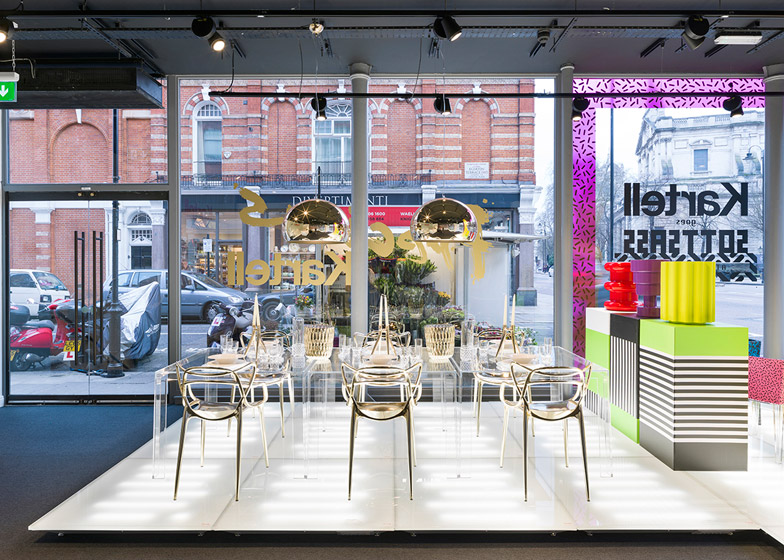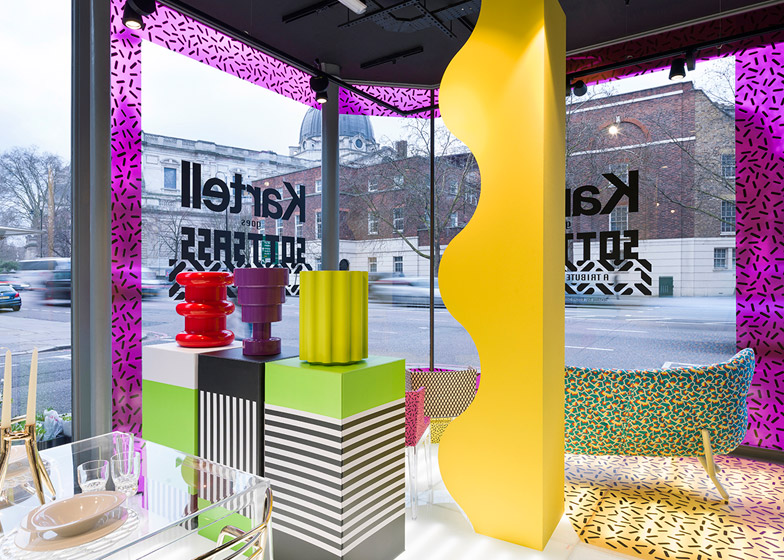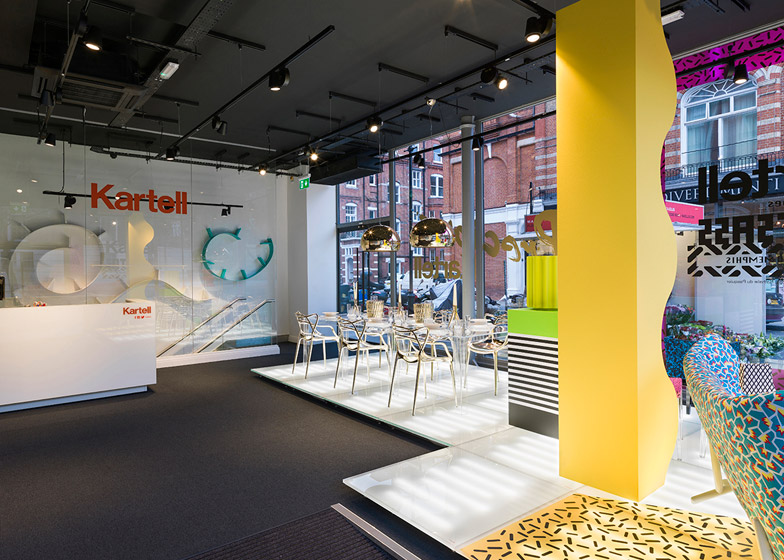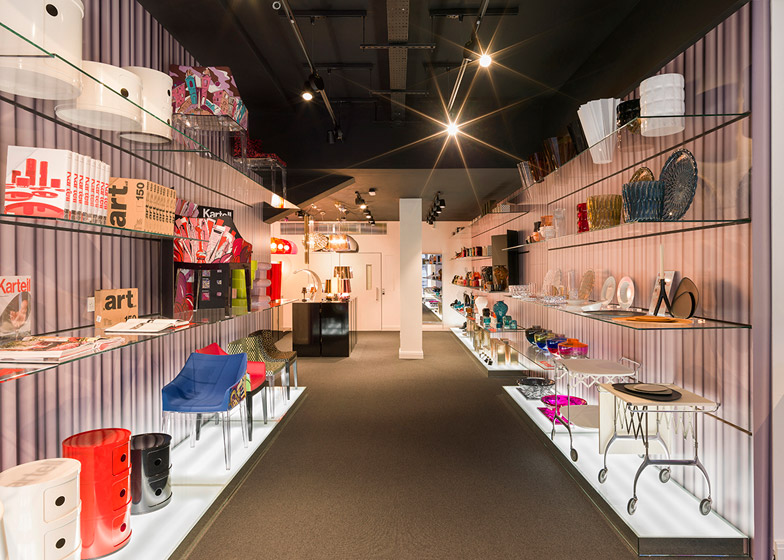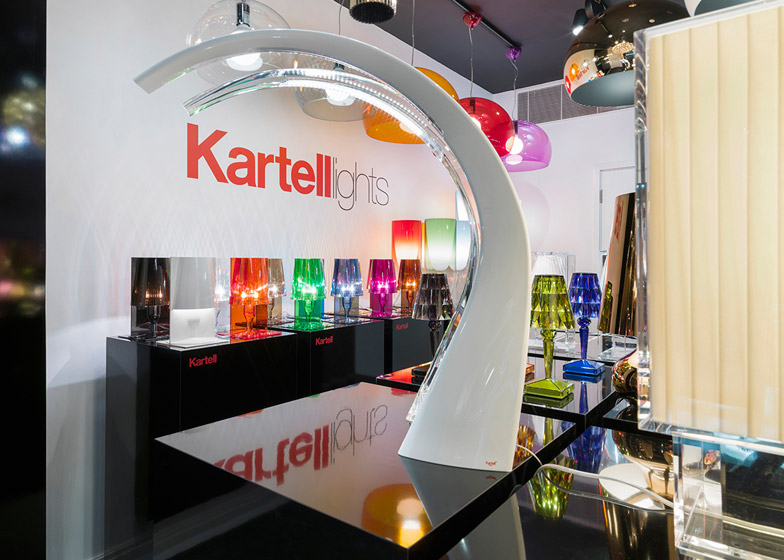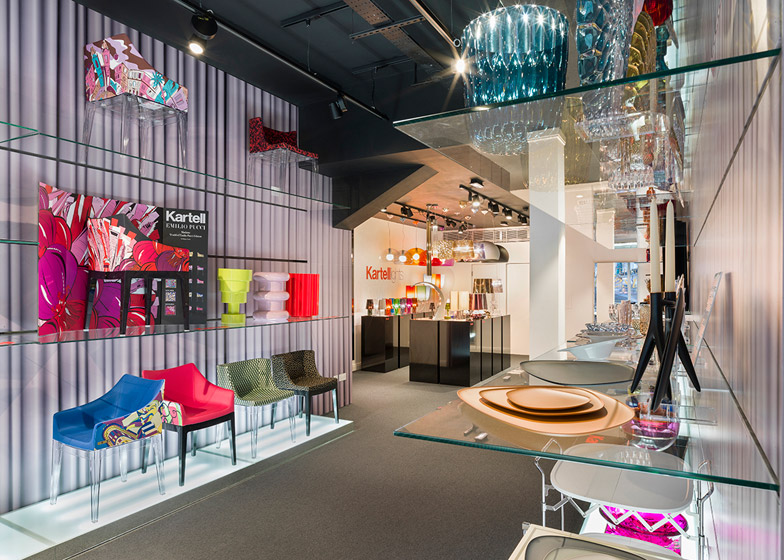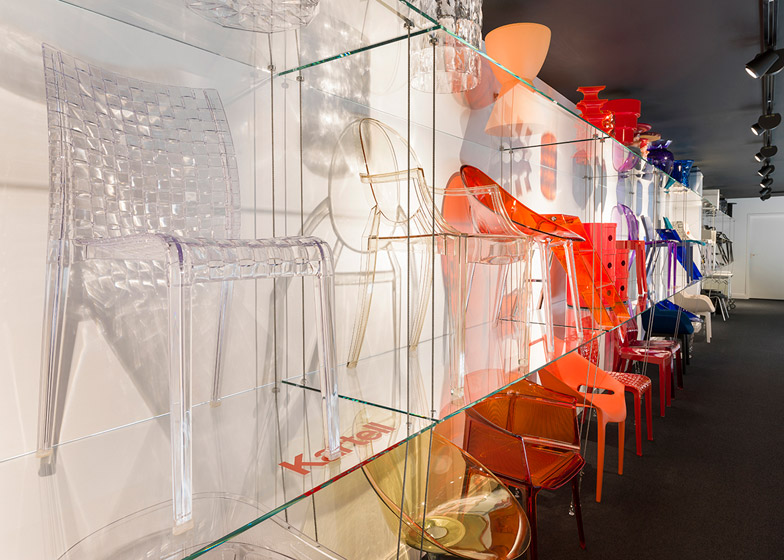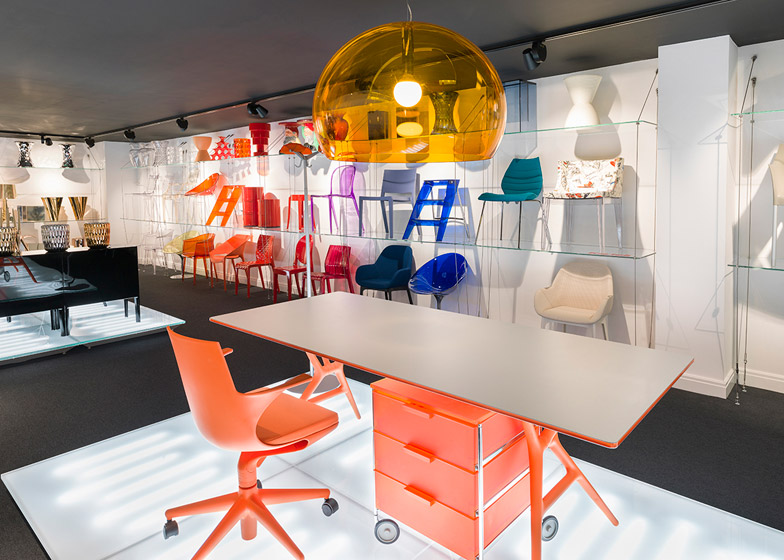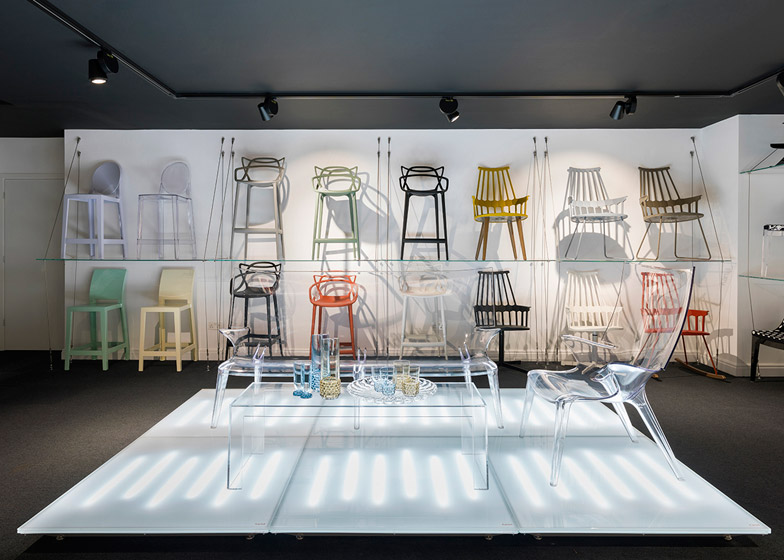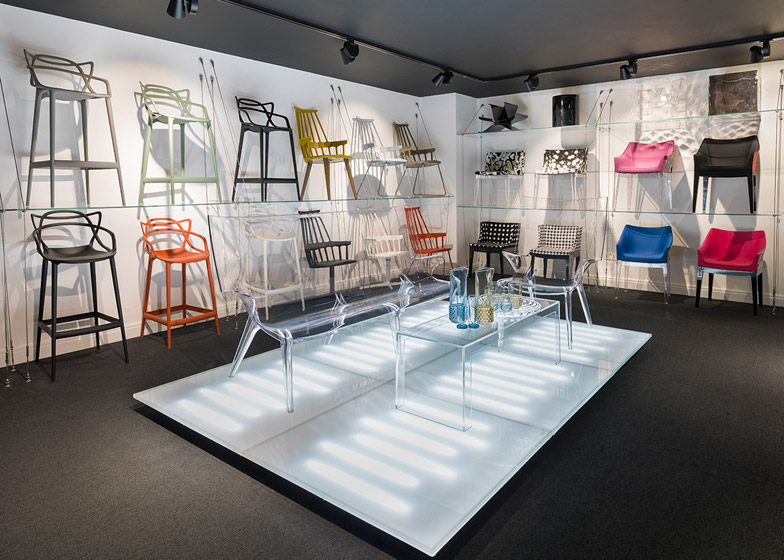Italian design brand Kartell has opened a new flagship showroom in London, where Dezeen spoke to CEO Claudio Luti about how the company pioneered the manufacture of plastic furniture and his plans for the future (+ interview).
Located on Brompton Road in Kensington, the store has its soft launch earlier this month and features an interior by Italian designer Ferruccio Laviani.
Laviani is responsible for all of Kartell's store designs and also created the classic Bourgie light for the brand, as well as other products including the Battery cordless lamp and the packaging for Kartell's new fragrance range.
"I work with the same designer that takes care of all our stores in the world," Luti told Dezeen. "I like to combine the same products with the same image, with the same window, with the same feeling."
The two-storey showroom presents a broad selection from Kartell's range of plastic furniture, lighting and tableware.
On the ground floor, the first window displays include colourful items designed by Ettore Sottsass, founder of the 1980s Memphis movement, which were only put into production last year.
The basement hosts larger furniture pieces such as the companies most-recognisable and best-selling products: the Masters, La Marie and Louis Ghost chairs by French designer Philippe Starck.
"Louis Ghost was a typical French chair made in transparent plastic," said Luti. "It was more comfortable, and more of a success than La Marie."
The store also showcases the brand's collection of home fragrances, which were launched last year as part of Luti's plans to expand Kartell's offering.
Kartell was founded in 1949, and Luti took over as CEO in 1988 after working for Italian fashion house Versace.
"I was not interested in staying in fashion," he said. "Kartell was very close, because design is so close to fashion. It was international, working with designers – it was very similar."
He developed the company's plastic technology to create a strong, durable transparent polycarbonate material based on police shields, which was used to create some of its most iconic products.
"This was fantastic for Kartell because for many years we were the only one with the transparency," said Luti. "Now there are a lot of copied materials, but it was really a passport for Kartell everywhere in the world."
The brand now has over 140 large stores and 250 concessions in other shops across the world. Luti, who owns 100 per cent of the company, has plans to grow its operations on all continents and continue the expansion of its product line.
Luti was briefly president of Milan's Salone Internazionale del Mobile, resigning in 2014 after 18 months in the role.
Read an edited version of our interview with Claudio Luti below:
Marcus Fairs: Tell me the story of Kartell and your involvement in the company.
Claudio Luti: The story started in 1949. Giuilo Castelli was a partner that was involved in the company. He was an engineer, he studied with Giulio Natta [the Italian chemist who won the Nobel Prize for his work on polymers] and he was curious. His idea was to work with all the new materials and follow all the new technology.
Marcus Fairs: What is your background and how did you get involved?
Claudio Luti: I have degree in economics, and I started with Versace in fashion. I was involved in all the creatives with Versace, in the fantastic global world of prêt a porter.
In 1988, I decided to sell my share to the Versace family, and with money I bought Kartell. Because first of all I was not interested in staying in fashion, for the fantastic life of the Versace company. And secondly Kartell was very close, because design is so close to fashion. It was international, working with designers – it was very similar.
In 1988, Kartell it was a little bit uncommon because in the 1980s, industrial design was in crisis. It was more important with Memphis that design was more artisanal, more expensive, more unique. My idea was to work with Kartell's know-how with plastic and try to work with design, really industrial design, to improve the quality of the products.
Marcus Fairs: Who were the first designers that you worked with?
Claudio Luti: My first three designers of choice were Philippe Starck, Antonio Citterio, Vico Magistretti. It was fantastic because all three were excited to do something industrial, which means long life, a strong investment, big numbers.
They were also really changing the way to work with the material. It's so impressive, you come to the studio and you see all the plastic from the 1970s and the 1980s right until 1988, they changed completely. Lucid, matte, copper, different textures, angles, milling of the thickness. Many small inventions that made a revolution.
After it started so well it was easy to continue with the same strategy with other designers, and we made many world firsts, many new techniques, for example transparency. I worked for two years with General Electric to develop the best material, the best transparency. We were starting from the police shield. It's transparent but very strong.
We started from this point, and we arrived at polycarbonate. It was fantastic to have the best transparency with a very strong material.
This was fantastic for Kartell because for many years we were the only one with the transparency. Now there are a lot of copied materials, but it was really a passport for Kartell everywhere in the world.
Transparency is Kartell. The Marie and Ghost chairs were fantastic bestsellers. Production took place all week, 24 hours a day to keep up with requests. Experience with transparent materials is what put Kartell on the top.
Marcus Fairs: What is the most successful product that you ever made?
Claudio Luti: Well there is the Ghost, Masters and La Marie [chairs by Starck]. And the Uncle Jack sofa [also by Starck] is unique. You cannot find another sofa made from 30 kilos of polycarbonate.
It's very difficult [to make] but it's very important for me because I think we're pushing other companies to search to do something extraordinary. After you do that, it's easy to do the other small things.
Marcus Fairs: How did the Louis Ghost chair come about?
Claudio Luti: It started with La Marie, the first transparent piece. When the material was ready it was given to Starck in Paris. I just said to him: "Philippe, [this is the] best material, do the most simple design because the material is so important." And Philippe said: "Okay, we should do La Marie because it's the most well-known and the design is the easiest". Then Philippe said: "We have the chair and it's the last chair, because we cannot do more".
One year or two years later, we had Louis Ghost. Louis Ghost was a typical French chair made in transparent plastic. It was more comfortable, and more of a success than La Marie. And from Louis Ghost we did a collection of chairs and with all the designer, everyone was excited.
Marcus Fairs: Last year you launched products by Ettore Sottsass and Alessandro Mendini. How did they come about?
Claudio Luti: Mendini is a friend [they met over 30 years ago when Kartell shared offices with Modo, the magazine Mendini edited]. I saw him recently and asked, Alessandro, do something with me! He was very shy and said, oh, but I'm not a designer. But he designed two pieces and I was so happy to work with him.
Regarding the Sottsass collection, I met Sottsass in 2003 or 2004 and we discussed a collection. He designed 10 pieces but the technology was not ready. And then he died [in 2007] and it was too difficult to do it at that time.
But over the last two years Ferrucio Laviani was pushing me to do it. It felt like the right moment and they work very well because they are very strong with lots of personality.
Marcus Fairs: What is the process for designing and producing new products?
Claudio Luti: Sometimes it's an idea for a design, sometimes it's a new material. What I do normally, I have a meeting every month with my team of designers. If they have any ideas we speak, we spend a lot of energy to talk about what we are to do.
It's so important to work with the clever people. I am lucky because most of the designers want to work with Kartell, we give money and visibility, a window everywhere in the world. Of course it's not enough to make a product, but also you have to take care that the distribution has to be the same level as your product.
Marcus Fairs: Kartell is opening own-brand stores around the world. How did that come about?
Claudio Luti: I took my ideas from fashion. When I worked for Versace, the store was so important because it was easy to show all the collections. Also in the use of the shop, the window, Versace was totally represented.
I was waiting until we had an important catalogue, then we started a Kartell shop. We started with Milan first, then Paris and Mallorca. It was a success, and we started everywhere in the world.
It's so important also to refresh and to take care of the windows every two months, every month. I would like to have new items every month, every two months changing the display.
Marcus Fairs: How many stores does Kartell have?
Claudio Luti: I have more or less 140 big shops. I have 250 shops in shops, and I have more than 1,000 under agreement.
Marcus Fairs: Who did you work with to design the new London store?
Claudio Luti: I work with the same designer that takes care of all our stores in the world, Ferruccio Laviani. We have Ferruccio take care of all the interiors for the store and I like to have the same image everywhere. I like to combine the same product with the same image, with the same window, with the same feeling.
We don't have to change the product or a window if we are in London or we are in Tokyo. I have to push the same image and to defend the same image.
Marcus Fairs: What are the regions that are most important and growing for you?
Claudio Luti: I'm looking for all the world, I feel like Kartell has to look everywhere. We decided to divide the world in 10 different areas and 10 different people in Milan take care of each area. And we have a lot of agents around the world.
Of course Europe – France, Italy, Germany – are important. England is not the same because in England there are not the same number of distributors that we have in Europe. Now we are looking at eastern Europe, because we are everywhere from Poland, Czech Republic, Romania, Moscow.
We are strong in Dubai, America of course. In New York we have agents, we have also the stock in New York. And also it is very strong in South America, you can see here all from Mexico, Columbia, Brazil, Chile, Ecuador.
Asia is strong. Now we have China of course, we are strong but we have space to grow. The United States is much better this year than China. I would like to do the best I can everywhere because a different market, now we have to grow everywhere.
Marcus Fairs: You have the New York showroom, do you have any other big stores in America and are you opening more?
Claudio Luti: Yes, many, many places. Of course New York. Miami opened 10 years ago. We have Los Angeles, but also the other cities and we have representation with spaces also everywhere. We have to.
Marcus Fairs: Kartell has a reputation for being one of the most profitable and successful of the Italian companies. Why is Kartell so strong?
Claudio Luti: I don't know. I know only Kartell is strong because we work, we have a lot of ideas, we make a lot of investments. It is a very solid company, we do my strategy, and it's profitable.
Marcus Fairs: It's still owned by you?
Claudio Luti: 100 per cent, yes.
Marcus Fairs: Would you sell one day?
Claudio Luti: No! I have no interest because I'm rich and I don't know where I have to invest, and everywhere else I take my profit from Kartell to make different investments. My children Federico and Lorenza are in the company, and I hope they can continue. If they want to continue I am very happy and if they don't want then maybe I have to sell it. It's easier that I buy somewhere else.
Marcus Fairs: And is that possible?
Claudio Luti: Now, my first option is brand expansion. I try to do many different extensions to open up the market, not to make an inflation of Kartell.
Secondly, maybe I can buy some other company but I don't see the development or synergy. I have such a respect for the brand, about the difference of the brand, the fortune is to remain autonomous. You have to have autonomy in the brand, it is the most the important thing.
Of course you can have much energy in administration, in finance, but most important is the soul. This is a very special company. If you lose this identity you lose the company. If you buy one brand doesn't have a good catalogue now, you have nothing.
Marcus Fairs: Why did you chose to expand into fragrances?
Claudio Luti: If we want to grow and adhere to different possibilities, first we have to be everywhere in the world. Secondly we have to follow the market, the everyday market – contract, online, very easy yeah?
And it's three different approaches, after you have to try to extend the product. First of all we have made lighting, which combines very well with the furniture. Then we worked with Laufen in Switzerland to have bathrooms. Now we're making a new catalogue for tableware, and we have a different distribution.
Fragrance is the same, we can have everything in our shop but also in special distribution. But also it's easy to grow without making a conflict.

